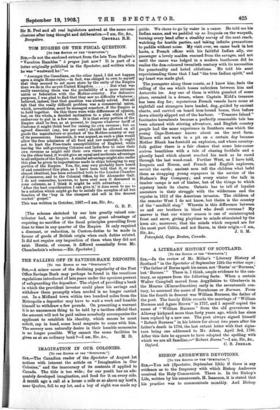IMAGINATION IN OUR COLONIES.
[TO THE EDITOR OF THE "SPECTATOR."] Sin,—The Canadian reader of the Spectator of August 1st notices with interest the article on " Imagination in Our Colonies," and the inaccuracy of its contents if applied to Canada. The title is too wide ; for our youth has an ade- quately developed imagination, and food for it on every side. A month ago a call at a house a mile or so above my host's, near Quebec, fell to my lot, and a boy of eight was made my guide. We chose to go by water in a canoe. He told me his Indian name, and we paddled up as Iroquois on the warpath, turning every bend after a stealthy survey of the next reach, watching for hostile parties, and taking infinite precautions to paddle without noise. My visit over, we came back in hot haste, a French officer with his faithful Indian ally, our passenger a lovely maiden rescued from the savages, and not until the canoe was lodged in a modern boathouse did he realise the dun-coloured twentieth century with its necessities for punctuality and hated ablutions. He told his aunt superintending these that I had " the true Indian spirit," and my heart was made glad.
The youngster along these coasts, as I know him, feels the calling of the sea which tosses unbroken between him and Antarctic ice. Any one of them is within gunshot of some place, revealed in a dream, where Captain Kidd's treasure has been dug for; mysterious French vessels have come at nightfall and strangers have landed, dug, guided by ancient charts, and carried on board iron-bound boxes, then before dawn silently slipped out of the harbour. " Treasure Island " fascinates hereabouts because a perfectly reasonable tale has been adorned with stirring adventure, and English country people had the same experience in Southern seas which the young Cape-Bretoner knows about on the next farm. Miners will not work in a pit on a certain day because Mother Blank has foretold an explosion, and where country- folk gather there is a fair chance that some late-comer arrives breathless with a tale of chasing footfalls and a ghostly hand which almost reached his neck as he raced through the last wood-road. Further West, as I have told, Iroquois and Huron, and French and English explorers, revisit the earth ; ancient men tell the children what befel them as strapping young voyageurs in the service of the Hudson's Bay Company ; and every winter the talk in lumber camps is not of timber, but of the things to which mystery lends its charm. Ontario has to tell of loyalist ancestors in their struggle with the wilderness and the repulse in 1812 of the American invasion. The children of the remoter West I do not know, but theirs is the country of the " sandhill stag." Wherein is this difference between us and our brothers in blood who dwell overseas ? My answer is that our winter season is one of uninterrupted frost and snow, giving playtime to minds stimulated by the keen air; moreover, that the minds which respond are for the most part Celtic, and not Saxon, in their origin.—I am, Sir, &c., J. S. M. Petersfield, Cape Breton, Canada.






































 Previous page
Previous page